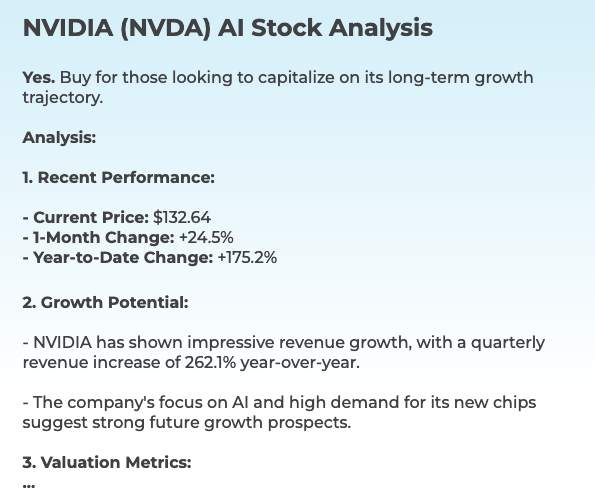Customer support plays an important aspect in deciding on the best AI trading platform. A competent and responsive support team can make a big difference when it comes to solving problems, optimizing platform usage, or ensuring an enjoyable trading experience. Here are the top 10 suggestions for evaluating the customer support offered by these platforms:
1. Assess the Availability of Support
24/7 support: Find out if the platform offers round-the-clock support, especially important for international market and real-time trade.
Hours of operation. If support 24 hours a day isn't available, make certain to confirm that you have support available during your trading time.
Find out if support is available on holidays, weekends or during closures of markets.
2. Test Response Times
Initial response. Test your support by sending them a query.
Resolution time: Determine the length of time required to resolve a problem.
Live chats: If available test the responsiveness and efficiency.
3. Evaluate Support Channels
Multiple channels: Make sure that the platform has support via multiple channels (e.g. phone or live chat, email and social media).
Find the channel you prefer to see if it is trustworthy and accessible.
Self-service options: Search for a comprehensive knowledge base, FAQs or community forums to speed up solving problems.
4. Examine the Quality of Support
Expertise: Make sure that the support staff have a complete knowledge of the platform trading, technical and other issues.
Problem-solving: Assess whether the support agent can solve complex issues effectively or escalate them appropriately.
Professionalism. Verify that the interactions with support were professional, courteous, friendly.
5. Check for Account Managers
Premium support: Make sure that the higher-tier plans or users from institutions have access to dedicated account managers.
Account managers that provide an efficient and customized service.
Building relationships: Make sure that Account managers are able to be reached and establish long-term relationships with users.
6. Review Support Documentation
Knowledge base: Verify that the platform includes an organized, searchable and extensive knowledge base, including tutorials and guides.
Video tutorials: Find out whether the platform has videos or webinars to help visual learners.
API documentation: If you're a developer, find a clear and detailed API document.
7. Review the Community Support and Peer Support
User forums: See if the platform has an active community of users or forum where users can discuss solutions and tips.
Social media forums - Look for groups that are not official Facebook, LinkedIn, Reddit and other social media websites in which users debate the various platforms.
Community engagement: Determine whether members of the team actively participate in discussions or forums within the community.
8. Evaluate Escalation Processes
Issue escalation. You must have a defined process for escalating unresolved issues to managers or other staff members at the top.
Follow-up Check to see if support follows up to ensure that the issue has been resolved.
Feedback loops: Test the ability of the platform to collect user feedback in order to improve support services.
9. Test Support in Extreme Situations
Market volatility: Contact support during times of high volatility to assess their responsiveness under pressure.
Issues with technical aspects: To determine how support will handle an issue (e.g. log-in issues, data discrepancy), simulate one.
Trade execution: Determine if the support team can assist with urgent issues in trade (e.g., delayed execution, failed orders).
Use User Feedback to improve
Reviews on the internet - Read the reviews of users on sites like copyright, G2, Reddit or Reddit.
Testimonials: Seek out reviews or case studies that demonstrate positive support experiences.
Complaints: See how the platform handles complaints and negative feedback about support.
Bonus Tips:
Support for trial period: Test the platform's support during the free trial or demo time to test its performance.
Support for languages: If you're a non-English speaker, verify that there is support available in the language you prefer.
Training and onboarding. Find out if the platform provides sessions for onboarding or training new users.
These tips will assist you in evaluating the quality of customer service provided by AI trading platforms that predict/analyze price fluctuations in stocks. This way, you'll be able to select a company with prompt, reliable and efficient assistance. Good customer support can improve your overall platform experience and enable you to get the most value from its capabilities. See the most popular ai trade recommendations for blog advice including trading with ai, stock ai, best ai trading app, market ai, AI stock picker, best ai trading software, ai trading, best AI stock, best ai for trading, best ai trading app and more.

Top 10 Tips For Evaluating The Regulatory Compliance Of Ai Stock Predicting/Analyzing Trading Platforms
Compliance with regulatory requirements plays an essential part in the evaluation of AI platforms for analysis and prediction of stocks. Compliance is important as it guarantees that the platform complies with regulations and legal frameworks. It also protects the users' personal information. Here are the top 10 suggestions on how to evaluate the conformity of these platforms.
1. Verify that you have a valid license and registered
Regulators: Check that the platform is licensed and registered with the appropriate financial regulatory bodies (e.g. SEC in U.S.A., FCA UK, ASIC Australia).
Make sure that the brokers included in the platform are licensed and monitored.
Public records: You may check the website of the regulator to see whether the platform has been registered and if there has had any violations over the years.
2. Take Data Privacy Measures Compliance
GDPR - If your site is located in the EU or serves users from the EU ensure that it is compliant with GDPR.
CCPA – For Californian users, check compliance with California Consumer Privacy Act.
Policy on handling data: Make sure that you go through the platform's privacy policies to learn the way in which user data is collected and stored.
3. Assessing Anti-Money Laundering measures
AML Policies: Ensure that the platform is governed by AML policies that are strong to detect and stop money laundering.
KYC procedures: Determine whether the platform is using Know Your Customer (KYC), which verifies user identities.
Examine the platform's monitoring of transactions. Does it monitor transactions and report any suspicious activity to authorities?
4. Make sure you are in your compliance with Trading Regulations
Market manipulation: Make sure the platform is equipped with measures to stop market manipulations, like swap trading or the spoofing.
Types of orders. Verify whether your platform is in compliance with the regulations for orders.
Best execution: Make sure that the platform is following the most efficient execution procedures to ensure that trades are executed at the most favorable price.
5. Examine Cybersecurity Security Compliance
Data encryption: Make sure the platform uses encryption to protect the data of users in transit and at rest.
Response to incidents: Verify that the platform has an incident response plan in place for cyber-attacks and data breaches.
Certifications: Check if the platform is certified in cybersecurity (e.g., ISO 27001, SOC 2).
6. Transparency and disclosure A Study
Fee disclosure: Ensure that the platform is clear about all fees, including hidden or additional charges.
Risk disclosure - Verify that the platform has clear risk disclosures. This is especially important for trading strategies with high leverage or risk.
Performance reporting: Verify that the platform is transparent and accurate reports regarding its AI models.
7. Verify the compliance with International Regulations
Trading across borders. If you are planning to do international trading, ensure that your platform adheres to all applicable regulations.
Tax reporting - Find out the platform's tools and reports to help users to comply with tax laws.
Compliance with sanctions: Verify that the platform adheres and does NOT allow transactions or trading with countries or entities that are banned.
8. Examining Audit trail and Record-Keeping
Transaction records: Ensure that the platform maintains detailed records of all transactions for regulatory and audit purposes.
Logs of activity for users (logs) The logs contain information about user activity. check if the platform records user activity such as trading and logins. Also, check if account settings are altered.
Audit readiness: Determine if your platform can provide the necessary logs and documentation in the case of an inspection from a regulatory authority.
9. Examine compliance with AI-specific Regulations
Algorithmic trading rules: If the platform allows algorithmic trading, be sure that it is compliant with the regulations such as MiFID II in Europe or Reg SCI in the U.S.
Bias and Fairness: Verify that the platform is monitoring biases and minimizes them within its AI models in order to guarantee fair trade.
Explainability: Ensure the platform provides clear explanations for AI-driven predictions and decision making, as required by some regulations.
10. Review User Commentaries and Historical Regulatory Historiography
Reviews from users: Perform research to evaluate the credibility of the platform for legal conformance.
Review the regulatory history to see if any regulatory violations were committed, and also penalties and fines.
Third-party auditors: Find out if the platform is audited regularly by a third party to make sure it is adhering to regulations.
Bonus Tips
Legal consultation: Contact an expert on the subject to verify if your platform is in compliance with laws.
Free trial period: You may avail a demo or a free trial to try out the features that ensure compliance of the platform as well as its documentation.
Customer support: Check that the platform can provide assistance to customers who have concerns or questions regarding compliance.
With these suggestions, you can effectively assess the regulatory compliance of AI platforms for stock prediction and analysis, ensuring you choose one that adheres to legal frameworks and protects your interests. Compliance does more than lower legal risks, but can also increase trust with the platform. See the best best AI stocks for website info including ai copyright signals, stock trading ai, ai copyright signals, chart analysis ai, best ai penny stocks, best AI stocks to buy now, how to use ai for stock trading, ai software stocks, stock trading ai, AI stock analysis and more.
